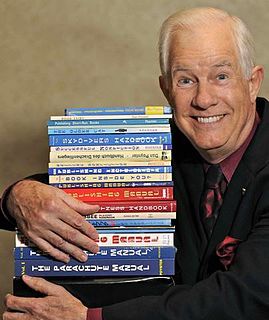A Quote by Robert Cormier
I find that most books that I don't like are those in which the authors have indulged themselves. I can almost sense when they're writing something for themselves.
Related Quotes
The most radical division that it is possible to make of humanity is that which splits it into two classes of creatures: Those who make great demands on themselves, piling up difficulties and duties; and those who demand nothing special of themselves, but for whom to live is to be every moment what they already are, without imposing on themselves any effort towards perfection, mere buoys that float on the waves.
When I'm writing, especially when I'm writing in first person, I don't think about the characterization, or how they are going to express themselves, I just express my own approach to these things. I think most writers can never divorce themselves from their private lives and personas; they are the ones that are writing. And the more they remove themselves from their own persona, the more, perhaps, mechanical the work becomes.
I just think that the skepticism about truth has almost completely flipped - from being something associated with generally left-leaning progressives to being something which is a tool of right-wing populists and demagogues. I think a lot of those people writing books ten years ago would now think those books are no longer needed, they've kind of been vindicated.
We like books that have a lot of dreck in them, matter which presents itself as not wholly relevant (or indeed, at all relevant) but which, carefully attended to, can supply a kind of "sense" of what is going on. This "sense" is not to be obtained by reading between the lines (for there is nothing there, in those white spaces) but by reading the lines themselves looking at them and so arriving at a feeling not of satisfaction exactly, that is too much to expect, but of having read them, of having "completed" them.
it is only on posters and in advertisement pages that Americans have those chubby cheeks, expanding smiles, smooth looks, and faces flushed with well-being. In fact, almost all are at odds with themselves; drink offers a remedy for this inner malady of which boredom is the most usual sign: as drinking is accepted by society, it does not appear as a sign of their [Americans'] inability to adapt themselves; it is rather the adapted form of inadaptability.
Most of those coming from the mainland are very destitute, almost naked. I am trying to find places for those able to work, and provide for them as best I can, so as to lighten the burden on the Government as much as possible, while at the same time they learn to respect themselves by earning their own living.
Most of those coming from the mainland are very destitute, almost naked. I am trying to find places for those able to work, and provide for them as best I can, so as to lighten the burden
on the Government as much as possible, while at the same time they learn to respect themselves by earning their own living.
An entirely honest man, in the severe sense of the word, exists no more than an entirely dishonest knave: the best and the worst are only approximations of those qualities. Who are those that never contradict themselves? yet honesty never contradicts itself: Who are those that always contradict themselves? yet knavery is mere self-contradiction. Thus the knowledge of man determines not the things themselves, but their proportions, the quan?tum of congruities and incongruities.

































